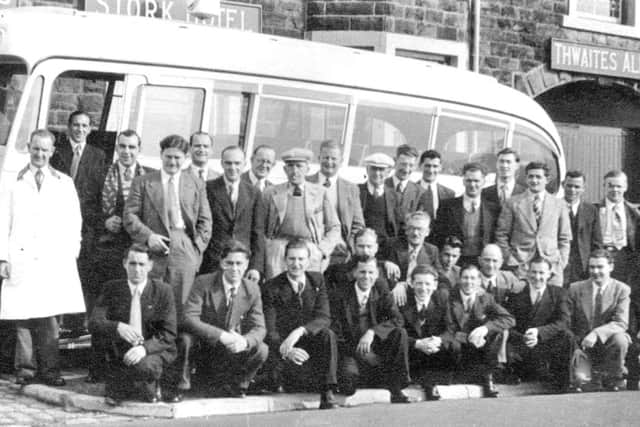Job opportunities as people switched from gas


This week he writes about his life after leaving school in 1963 to take up an apprenticeship with the Yorkshire Electricity Board.
This was in the days when people were turning from gas to electricity in large numbers and, consequently, offering great opportunities for young men seeking apprenticeships in the industry.
Advertisement
Hide AdAdvertisement
Hide AdThe Yorkshire Electricity Board (YEB) where John worked, was a popular choice, as was the Yorkshire Transformer company in Thornhill Lees.


The picture above shows employees from the latter on a works outing, and, although John never worked there, many of those pictured would have started working life as apprentices.
Here is what John writes about his time as an apprentice with the Yorkshire Electricity Board.
“I had always been fascinated by electricity, so prior to leaving school in 1963, I applied to several companies seeking employment as an apprentice electrician.
Advertisement
Hide AdAdvertisement
Hide Ad“Eventually, I was offered an apprenticeship with the Yorkshire Electricity Board which I happily accepted.
“Being one of the nationalised industries, wages were standard, but there were other benefits such as full sickness pay, which came in very handy when I was off work for six weeks with a football related injury.
“In September 1963, kitted out with my khaki coloured World War Two gas mask bag containing my sandwiches and new flask, henceforth to be known as “snap”, I made my way along Bradford Road to the YEB depot.
“I received two pair of green overalls, given a short induction talk and then taken by van to the George Street depot at Batley, where I was to be based for the next three months.
Advertisement
Hide AdAdvertisement
Hide Ad“The apprenticeship scheme was called ‘Block Release’ whereby you alternately did three months work experience and three months at the Engineering College in Leeds.
“Now in an adult world, it was quite an eye opener for a somewhat naive youth listening to men talking.
“I could hardly believe my ears at what they said and how they said it.
“I had to crawl under floorboards, climb ladders and go into lofts, and the only illumination was a candle.
Advertisement
Hide AdAdvertisement
Hide Ad“There were no power tools, so hammering, drilling and sawing were all done by hand.
“You had to be respectful, do as you were told (not asked) and toughen up quickly, both emotionally and physically, to be accepted by the adults.
“Learning new skills, getting to know new workmates and riding in the van to the areas of Wakefield, Ossett, Batley and Dewsbury, and carrying out work in people’s houses, was interesting but sometimes shocking.
“In most houses you’d be happy to have a cup of tea if offered, but in a small number of others, you had to take a deep breath before entering as the smell was overpowering.
Advertisement
Hide AdAdvertisement
Hide Ad“I couldn’t believe how some people chose to live like they did, but refusing to work in these houses wasn’t an option.
“During the early days of my apprenticeship I was taught that the earth wire was the most important one in an electrical circuit for safety reasons. I thought back to my mum using her clothes iron plugged into an adaptor on the ceiling light bulb holder. No earth! And also the heat resistant asbestos pad on the wooden fold up ironing board.
“My first pay packet of £3. 6s was handed over to my mum and I was given back £1.10s. After paying for my bus fares I could spend the remainder on what I wanted. No more ‘muckment’ for me, I could now afford a bar of chocolate, a trip to the cinema, attend Dewsbury Town Hall dances and, of course, later visit Fearnsides, pub near Crow Nest Park, to master the art of drinking pints with my workmates.
“Like some other youths I experienced the spinning bedroom after having had one too many, but the Sunday morning hangover was quickly dispelled with the regular fifteen-a-side game of football in the Rectory Park, Thornhill.
Advertisement
Hide AdAdvertisement
Hide Ad“ On my 18th birthday I started paying my board, which basically meant you gave your parents an agreed weekly sum, and you were then expected to pay for everything else yourself, such as clothes, holidays and my first motorbike, a BSA Bantam, which I rode nearly everywhere at full throttle.
“On Sunday afternoons, motorcyclists would meet at Horbury Bridge Cafe and do speed test rides up to Grange Moor roundabout and back as quickly as they possibly could. Imagine coming past The Kaye Arms, and the pit where the Mining Museum now stands, and down past Middlestown, trying to reach 100 mph – “The Ton”. There were a few accidents and some fatalities during those years.
“Work provided lots of humorous moments, but the funniest occurred while I was working at the Inspection Department on Bradford Road, Dewsbury.
“One of the inspectors always wore a really long gabardine raincoat which nearly reached his ankles and he was forever catching it on the disarmed WWII wartime shell that was used to prop the office door open in summer.
Advertisement
Hide AdAdvertisement
Hide Ad“One day he caught his coat on the shell, yet again, and in a fit of pique picked it up and hurled it over the low dry stone wall into Batley Beck which ran past the depot yard.
“A few days later an engineer, sitting on the wall smoking a cigarette, spotted the shell sticking out of the beck and raised the alarm.
“The Army Bomb Disposal Squad from York were summoned to come and deal with it. They arrived around midday and quickly decided that the depot should be evacuated.
“One of the men asked them how long it was likely to take and was informed at least two hours. The popular opinion was that we would be a lot safer in a Dewsbury pub, so off we went.
Advertisement
Hide AdAdvertisement
Hide Ad“Once there, the inspector who had hurled the shell started having cold feet and suggested that the Bomb Squad should be told the truth.
“He was swiftly persuaded that he might get into trouble and so at two-o-clock when the pub closed, we sauntered back to the depot, fully refreshed to be informed that the shell was a dud. What a relief.
“Someone asked – ‘Would it be possible to have it as a doorstop for our office as a memento?’
“So, there it was returned to its rightful place!”
To be continued: [email protected].